|
| Our Field Ecology Center published more than
180 methodical materials for nature studies. Some of them are in English: |
|
|
|
FIELD CENTER and DISCIPLINES
Visit our small photogallery about the Field Center.

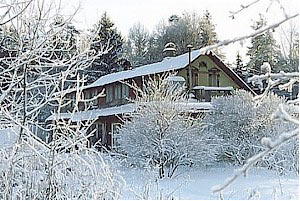 Association "Ecosystem" has its own field biology station
- Center for Field Studies. Association "Ecosystem" has its own field biology station
- Center for Field Studies.
It helps to reach the goals of environmental education through field ecology.
The Center lies in the sanitary zone surrounding the city of Moscow, that provides
pristine state of the local environment. The Center is surrounded by old-growth conifer
(pine and spruce) and deciduous forests. Nearby river and a lake also present such
habitats as wet meadows and marshes.
Center works with Moscow school-students and teachers, school-teachers associations and
biological school groups, leaders and members of youth public environment organizations,
with educators and different staff categories from the additional education system,
biology and geography scientists who use the principles and approaches of the outdoor
ecology in their activity from all Russian regions. Classes are taught at the Center
year-round.
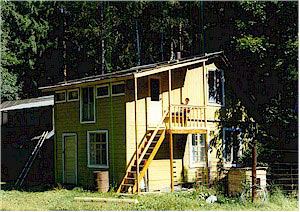
Visit our small photogallery
about our Field Center.
Our educational program
includes the following topics in the natural sciences:
- topography and cartography
- geology and soil science
- botany and plant identification
- zoology
- aquatic ecology
- bioindication and ecomonitoring
We teach these disciplines during nature excursions and field
research exercises.
Excursions aim to get recognition of such components of the environment as rocks and
minerals, relief, soils, water bodies, flora and fauna. We also emphasize organisms'
interactions and coexistence in natural communities during different seasons.
Field studies are independent projects, where students use research methods of
"real" science in their ecological research.
Following are short syllabi of the study disciplines.
Topography and Cartography include:
Basics of orientation in the field;
Working with a map, compass, and simple geodesic equipment;
Legend, map, and profile drawing using different methods.
|
 |
Geology and Soil Science include:
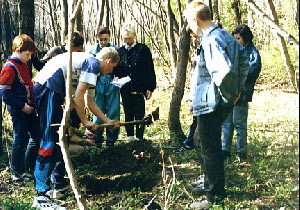 |
- Minerals and rocks identification and description of geological profiles;
- Description and investigation of the soil profiles;
|
Botany and Plant Identification
include:
- Plant morphology and identification, flora description;
- Geobotanical classification of plant communities (forest, meadow, marsh);
|
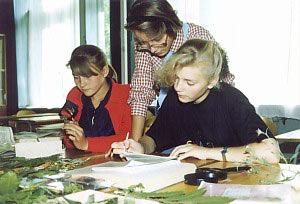 |
Zoology includes:
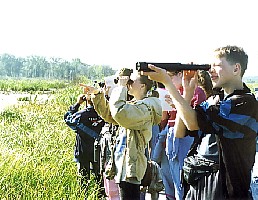 |
- Overview of the vertebrate and invertebrate fauna of temperate zone of European Russia;
- Studies of abundance: insects, amphibians, birds, small and large mammals in different
seasons;
- animal ecology and behavior investigation.
|
Aquatic Ecology includes:
- Studies of main hydrological characteristics of rivers, streams, lakes and swamps.
- Studies of aquatic flora and fauna in different bodies of water in the seasons of the
year (aquatic plants, plankton, benthos, periphiton).
|
 |
Bioindication and Ecomonitoring
include:
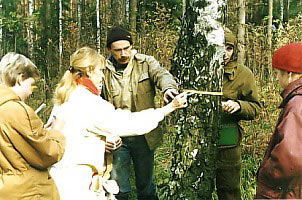 |
- Bioindication of terrestrial ecosystems: lichen indication, forest and meadow vegetation
assessment;
- Bioindication of aquatic ecosystems: studies of zooplankton, macrozoobenthos, and
periphiton;
- ecological assessment of the aquatic habitats and water quality control by physical and
chemical characteristics;
|
Other "Ecosystem's" educational activities include:
- one week methodological seminars for young ecologists and their supervisors from all
regions of Russia;
- 2-5 days ecological courses for Moscow schoolchildren of 5-11th grades (11-16 years
old).

- seminars, conferences and meetings in field ecology for school teachers and out-door
educators from every region of CIS;
- publications
for teachers and young ecologists, describing methods for studying nature;
- distribution of Russian and foreign literature on ecological education, including
textbooks, field guides, audio and video identification materials.
|







